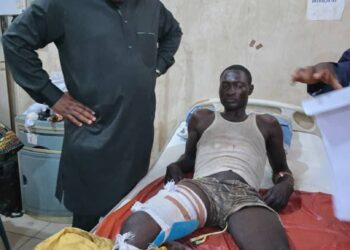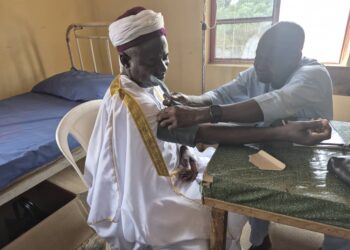An international, independent medical humanitarian organisation, Médecins Sans Frontières (MSF) popularly known as “Doctors Without Borders” on Monday called on the international community to immediately scale up support for treatment of diphtheria in Nigeria.
MSF which made call in a statement said there is need to improve treatment, preventive measures and contact tracing to control the spread of diphtheria in Nigeria.
The statement reads : “A serious diphtheria outbreak is tearing through Nigeria, where thousands of people have been infected and hundreds more have died.
“With low national vaccination coverage and a worldwide shortage of lifesaving antitoxin threatening to worsen the outbreak.
“Médecins Sans Frontières (MSF) urges the international community to immediately scale up support to improve treatment, preventive measures and contact tracing to control the outbreak’s spread.”
MSF emergency project medical doctor, Dr Hashim Juma Omar was quoted to have said: “We’re currently seeing more than 700 people with suspected diphtheria and admitting more than 280 patients on a weekly basis in Kano state’s two diphtheria treatment centres,”
He added that : “Women and children aged under five are the most vulnerable groups and are the people most affected right now in Kano state. And they really need help.”
The statement said diphtheria is a highly contagious and potentially life-threatening bacterial disease which can present in respiratory or cutaneous forms.
“Without treatment, it can kill half of people infected; even with treatment, the disease is still fatal in five per cent of patients.
Nigeria’s Centre for Disease Control has declared an outbreak of the disease on 20 January 2023; between May 2022 and early September 2023, over 6,000 confirmed cases were recorded.
Around 4,000 suspected cases were recorded in the country in August 2023 alone, with over three-quarters coming from Kano state.
MSF teams are responding to the outbreak in Kano, Borno and Bauchi states.
However, responding to the outbreak has proved challenging, due to a worldwide shortage of lifesaving diphtheria antitoxin used in treatment, caused by dwindling production capacity.
Omar said: “While we provided 2,000 doses of diphtheria antitoxin last month in Kano, securing doses of the antitoxin has been one of the biggest challenges in this crisis,” noting that: “We have placed an urgent additional order of 5,000 doses to cover the needs in our projects, but still, it is not enough.”
He said in light of these challenges, improved efforts to reduce the disease’s transmission and to strengthen outbreak preparation and response in Nigeria are crucial.
“This includes vaccination; underlying the outbreak is a low vaccination rate, with only 70 per cent of children having received their first dose of diphtheria-tetanus-pertussis vaccine.
“The decline in immunization led to a reported 25 million un- or under-vaccinated children in Nigeria in 2021.
“However, funding for vaccines and implementation costs remains a barrier to scaling up; with Kano State alone requiring millions of doses to target at-risk groups.”
The statement added that in addition to urgent antitoxin and vaccination needs, “we urge international organisations to immediately scale up improved surveillance and contact tracing, and measures to strengthen the local health system.
” In Maiduguri, Borno State, we have added a 20-bed diphtheria treatment clinic to our paediatric hospital in Gwange III PHC, where over 110 people have been treated by our teams since January.
“In Kano state, our teams have seen 6,707 people with suspected or confirmed cases of the disease since January, working in treatment centres with a total bed capacity of 147.
“In Bauchi state, where we have already treated 21 cases with diphtheria during our usual medical activities in Ganjuwa, we are monitoring the situation there and in Jama’are, and are ready to start diphtheria-specific activities based on the needs.
‘Our teams are also responding to diphtheria in neighbouring countries. In mid-August, we started supporting the Ministry of Health in Guinea, where we work in an epidemic diseases treatment centre in Siguiri prefecture.
“More than 100 people have been admitted since the start of our activities.
“In collaboration with the Nigerien Ministry of Health, our teams conducted a first-round of a preventive vaccination campaign in Kantché and Amsoudou health areas in early September, vaccinating nearly 48,500 people.
“A second round of vaccinations will take place in early October.
“The number of suspected cases in other countries in the region adds to the urgency of increasing access to antitoxin drugs and vaccination initiatives.” (vitalnewsngr.com)






















